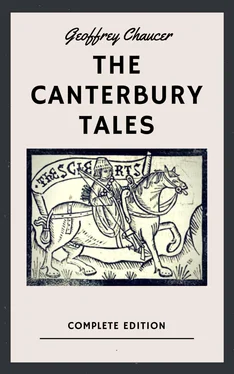Before me sorrowful wretched creature,
Out of this prison help that we may scape.
And if so be our destiny be shape
By etern word to dien in prison,
Of our lineage have some compassion,
That is so low y-brought by tyranny."
And with that word Arcita *gan espy* *began to look forth*
Where as this lady roamed to and fro
And with that sight her beauty hurt him so,
That if that Palamon was wounded sore,
Arcite is hurt as much as he, or more.
And with a sigh he saide piteously:
"The freshe beauty slay'th me suddenly
Of her that roameth yonder in the place.
And but* I have her mercy and her grace, *unless
That I may see her at the leaste way,
I am but dead; there is no more to say."
This Palamon, when he these wordes heard,
Dispiteously* he looked, and answer'd: *angrily
"Whether say'st thou this in earnest or in play?"
"Nay," quoth Arcite, "in earnest, by my fay*. *faith
God help me so, *me lust full ill to play*." *I am in no humour
This Palamon gan knit his browes tway. for jesting*
"It were," quoth he, "to thee no great honour
For to be false, nor for to be traitour
To me, that am thy cousin and thy brother
Y-sworn full deep, and each of us to other,
That never for to dien in the pain <12>,
Till that the death departen shall us twain,
Neither of us in love to hinder other,
Nor in none other case, my leve* brother; *dear
But that thou shouldest truly farther me
In every case, as I should farther thee.
This was thine oath, and mine also certain;
I wot it well, thou dar'st it not withsayn*, *deny
Thus art thou of my counsel out of doubt,
And now thou wouldest falsely be about
To love my lady, whom I love and serve,
And ever shall, until mine hearte sterve* *die
Now certes, false Arcite, thou shalt not so
I lov'd her first, and tolde thee my woe
As to my counsel, and my brother sworn
To farther me, as I have told beforn.
For which thou art y-bounden as a knight
To helpe me, if it lie in thy might,
Or elles art thou false, I dare well sayn,"
This Arcita full proudly spake again:
"Thou shalt," quoth he, "be rather* false than I, *sooner
And thou art false, I tell thee utterly;
For par amour I lov'd her first ere thou.
What wilt thou say? *thou wist it not right now* *even now thou
Whether she be a woman or goddess. knowest not*
Thine is affection of holiness,
And mine is love, as to a creature:
For which I tolde thee mine aventure
As to my cousin, and my brother sworn
I pose*, that thou loved'st her beforn: *suppose
Wost* thou not well the olde clerke's saw<13>, *know'st
That who shall give a lover any law?
Love is a greater lawe, by my pan,
Than may be giv'n to any earthly man:
Therefore positive law, and such decree,
Is broke alway for love in each degree
A man must needes love, maugre his head.
He may not flee it, though he should be dead,
*All be she* maid, or widow, or else wife. *whether she be*
And eke it is not likely all thy life
To standen in her grace, no more than I
For well thou wost thyselfe verily,
That thou and I be damned to prison
Perpetual, us gaineth no ranson.
We strive, as did the houndes for the bone;
They fought all day, and yet their part was none.
There came a kite, while that they were so wroth,
And bare away the bone betwixt them both.
And therefore at the kinge's court, my brother,
Each man for himselfe, there is no other.
Love if thee list; for I love and aye shall
And soothly, leve brother, this is all.
Here in this prison musten we endure,
And each of us take his Aventure."
Great was the strife and long between these tway,
If that I hadde leisure for to say;
But to the effect: it happen'd on a day
(To tell it you as shortly as I may),
A worthy duke that hight Perithous<14>
That fellow was to the Duke Theseus
Since thilke* day that they were children lite** *that **little
Was come to Athens, his fellow to visite,
And for to play, as he was wont to do;
For in this world he loved no man so;
And he lov'd him as tenderly again.
So well they lov'd, as olde bookes sayn,
That when that one was dead, soothly to sayn,
His fellow went and sought him down in hell:
But of that story list me not to write.
Duke Perithous loved well Arcite,
And had him known at Thebes year by year:
And finally at request and prayere
Of Perithous, withoute ranson
Duke Theseus him let out of prison,
Freely to go, where him list over all,
In such a guise, as I you tellen shall
This was the forword*, plainly to indite, *promise
Betwixte Theseus and him Arcite:
That if so were, that Arcite were y-found
Ever in his life, by day or night, one stound* *moment<15>
In any country of this Theseus,
And he were caught, it was accorded thus,
That with a sword he shoulde lose his head;
There was none other remedy nor rede*. *counsel
But took his leave, and homeward he him sped;
Let him beware, his necke lieth *to wed*. *in pledge*
How great a sorrow suff'reth now Arcite!
The death he feeleth through his hearte smite;
He weepeth, waileth, crieth piteously;
To slay himself he waiteth privily.
He said; "Alas the day that I was born!
Now is my prison worse than beforn:
*Now is me shape* eternally to dwell *it is fixed for me*
Not in purgatory, but right in hell.
Alas! that ever I knew Perithous.
For elles had I dwelt with Theseus
Y-fettered in his prison evermo'.
Then had I been in bliss, and not in woe.
Only the sight of her, whom that I serve,
Though that I never may her grace deserve,
Would have sufficed right enough for me.
O deare cousin Palamon," quoth he,
"Thine is the vict'ry of this aventure,
Full blissfully in prison to endure:
In prison? nay certes, in paradise.
Well hath fortune y-turned thee the dice,
That hast the sight of her, and I th' absence.
For possible is, since thou hast her presence,
And art a knight, a worthy and an able,
That by some cas*, since fortune is changeable, *chance
Thou may'st to thy desire sometime attain.
But I that am exiled, and barren
Of alle grace, and in so great despair,
That there n'is earthe, water, fire, nor air,
Nor creature, that of them maked is,
That may me helpe nor comfort in this,
Well ought I *sterve in wanhope* and distress. *die in despair*
Farewell my life, my lust*, and my gladness. *pleasure
Alas, *why plainen men so in commune *why do men so often complain
Of purveyance of God*, or of Fortune, of God's providence?*
That giveth them full oft in many a guise
Well better than they can themselves devise?
Some man desireth for to have richess,
That cause is of his murder or great sickness.
And some man would out of his prison fain,
That in his house is of his meinie* slain. *servants <16>
Infinite harmes be in this mattere.
We wot never what thing we pray for here.
We fare as he that drunk is as a mouse.
A drunken man wot well he hath an house,
But he wot not which is the right way thither,
And to a drunken man the way is slither*. *slippery
And certes in this world so fare we.
We seeke fast after felicity,
But we go wrong full often truely.
Thus we may sayen all, and namely* I, *especially
That ween'd*, and had a great opinion, *thought
Читать дальше












